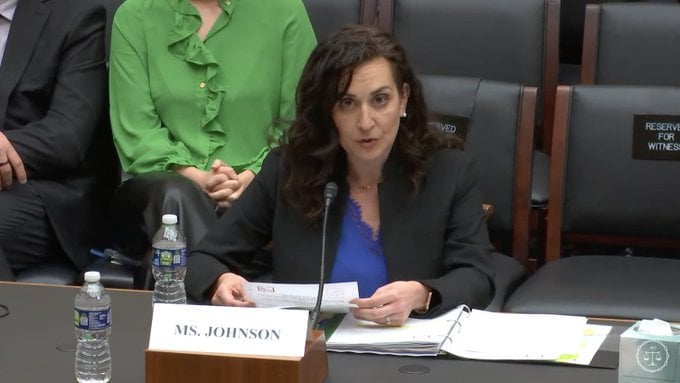Book bans are surging around the world not just by authoritarian regimes such as those in Russia and China but also in the US.
More than 10,000 books were removed from American school shelves in the last academic year, a tripling over the previous year, and free speech advocates and publishers are fighting back.
Banned Books Week kicked off on 22 September with events and exhibitions. The annual event was launched by the American Library Association (ALA) in 1982 in response to a rise in book challenges in schools, libraries and bookstores.
“Let Freedom Read Day” on 28 September is focused not just on getting Americans to check out banned books from the library but to find out where their candidates stand ahead of November’s state and presidential elections.
“We observe Banned Books Week but we don’t celebrate,” says Deborah Caldwell-Stone, who directs the ALA’s Office for Intellectual Freedom. “Banned books are the opposite of the freedoms promised by the First Amendment,” she said, referring to the legal protection of freedom of speech in the US.
Critics of the US love to point out any backsliding from its lofty democratic ambitions but it is thanks to the efforts of groups such as the ALA that we even know about rising censorship.
Shield against oppression
Elsewhere in the world, it is more risky to resist, with activists facing imprisonment and state violence. “Through book bans, authorities attempt to suffocate the essence of freedom but we must stand firm,” says Burhan Sonmez, president of PEN International, an association of writers.
The group has highlighted rising book bans in Belarus, Brazil, China, Hungary, the Russian Federation, Türkiye and the US.
“Let literature be our shield against oppression, a beacon of resilience in the darkness,” he says.
Banning books is older than printing
Banning books is older than printing. The Catholic Church, for example, pushed back against copies of the Bible in any language other than Latin to ensure the authority of church leaders. Samizdat, or self-published works, rose in the Soviet Union in response to book bans.
In Britain, prurience about sex led not only to the banning of James Joyce’s “Ulysses” between 1922 and 1936 but legislation known as Section 28 from 1988 to 2000. This law prohibited the “promotion of homosexuality” in schools, which meant certain books could not be stocked.
In our times, books with LGBTQIA+ and racial themes, rather than the political, irreligious or profane, arouse the most ire of authorities around the world but not entirely.
George Orwell’s “Animal Farm” is banned in Cuba for its criticism of communism while Salman Rushdie’s “The Satanic Verses” is prohibited in much of the Middle East and Asia for its “blasphemy” about Islam.
China bans books in schools that are “not in line with socialist core values; that have deviant world views, life views and values.”
‘High-spirited mental outlook’
PEN International has monitored book removals from Hong Kong’s public library system after the National Security Law was implemented there in 2020. Books removed include those by pro-democracy figures such as Joshua Wong and, in 2021, a librarian was suspended after displaying books by imprisoned media publisher and writer Jimmy Lai.
Chinese university students must also undergo mandatory political education classes known as “sizheng” to instil loyalty to the Communist party. “The government fears that an increasingly wobbly economy could undermine support for the party, particularly among young people,” wrote Kai Waluszewski in the Financial Times recently. “Evidence that sizheng is producing a ‘high-spirited mental outlook’ among them is mixed.”
In the UK, Canada, Australia and US, conservative groups are particularly incensed by race, sexuality and neurodiversity
In the UK, Canada, Australia and US, conservative groups are particularly incensed by race, sexuality and neurodiversity.
Tory officials in the last British government opposed critical race theory that sought to explore systemic racism while drag performers proved controversial even through the British Christmas pantomime tradition features men dressed as women.
In Canada, parental groups have urged school boards to ban LGBTQIA+ books and change the curriculum to exclude critical race theory as did Australia’s Senate in 2021.
Tough laws
At least 13 books were banned for the first time in the last US school year, including Alex Haley’s “Roots: The Saga of an American Family” about an enslaved person and James Baldwin’s “Go Tell It on the Mountain”.
About 8,000 out of the 10,000 book bans were in Florida and Iowa where tough laws have targeted classroom material amid opposing lawsuits from teachers, students and parents.
 The US has always viewed itself as a beacon of democracy — even though it has often failed to live up to its self-declared values and principles - Nadine Farid Johnson
The US has always viewed itself as a beacon of democracy — even though it has often failed to live up to its self-declared values and principles - Nadine Farid Johnson
Utah, South Carolina and Tennessee have also recently enacted book bans, says PEN America, which will release a final count on the number of banned books later this year after it has tallied the count using local media reports, school district web sites, school board minutes and organisational partners.
“But the US has always viewed itself as a beacon of democracy — even though it has often failed to live up to its self-declared values and principles,” wrote Nadine Farid Johnson, managing director of PEN America Washington, who pointed out that in 2021, the International Institute for Democracy and Electoral Assistance classified the US as a backsliding democracy for the first time.
“Now, the signs are ominous,” she says.